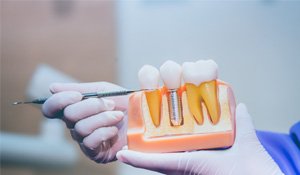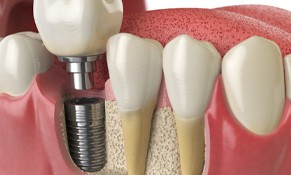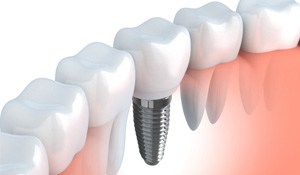Dental Implants – Wichita Falls, TX
The Most Comprehensive Way to Replace Missing Teeth

At Strohman dental, we can make your smile whole again. If you’ve suffered tooth loss due to decay, gum disease, or injury, Dr. Shelley Strohman can help you achieve a permanent, beautiful smile with dental implants. Working closely with a dental implant specialist, Dr. Strohman will guide you through the procedure to rebuild your pearly whites from the roots up. Keep reading to learn more about dental implants in Wichita Falls or give us a call today to schedule your consultation.
What Are Dental Implants?

Dental implants are small metal posts that are directly embedded into the jawbone to support a restoration (such as a crown, bridge, or denture). Since titanium is biocompatible, it will serve as your new permanent tooth roots. Once the implants bond with the jawbone, you can expect incredible stability which surpasses that of traditional restorations. Your results will feel, look, and function like your natural pearly whites, and you can be sure to enjoy them for many years to come.
The 4-Step Dental Implant Process

Your dental implant process will typically go in the following order:
- Initial consulatation – During your appointment, we’ll assess your oral health, discuss your smile goals, and develop a detailed treatment plan to rebuild your missing teeth. We’ll also determine if you require preliminary procedures to ensure the success of your implants, such as bone grafting or gum disease therapy.
- Placement procedure – We’ll refer you to one of our trusted local implant specialists to perform your placement surgery. They’ll accurately position your metal posts in your jawbone while keeping you safe and comfortable throughout the appointment.
- Osseointegration – Once you receive your implants, you’ll need to allow your jawbone to fuse with your new roots via osseointegration. This will create the stable foundation your new teeth need to remain strong and lifelike.
- Final Restoration – After your implants have integrated and you’re fully recovered, you’ll come back into our office to receive your brand-new crown, bridge, or denture.
Benefits of Dental Implants

At this point, dental implants are seen as the ultimate tooth replacements. They’re so popular that dentists place roughly 500,000 of them yearly! As for why implants are so well-loved, the reason is their unique placement method. The prosthetics fuse with a patient’s jaw, resulting in perks that dentures and bridges can’t match. From there, they greatly improve one’s quality of life. To learn more about the benefits of dental implants, keep reading or call our office.
Day-to-Day Benefits

As most would expect, implants’ day-to-day benefits get the most publicity. Such upsides include:
- Gorgeous Results – Implants are capped with porcelain crowns, so they blend seamlessly with their surroundings. In fact, they look so beautiful and lifelike that your peers won’t notice they’re artificial!
- High Confidence – Due to filling in your smile gaps, implants can boost your confidence. This mood shift will then ease your social anxiety and help you chat with friends and family.
- Easy Eating – Implants restore your bite force by fusing with (and stimulating) your jawbone. In doing so, they help you eat your favorite tough foods again!
- Simple Care – Since implants are so lifelike, they don’t need special care. You can just clean them as you would natural teeth. In other words, practice twice-daily brushing, once-daily flossing, and frequent mouth rinses.
Health Benefits

Implant benefits cover more than just the everyday. On the contrary, some of the treatment perks are health-related. Relevant examples of these are:
- A Cleaner Mouth – If you leave your jaw sockets empty, they’ll allow harmful bacteria to breed. Luckily, implants fill these spaces and reduce the risk of gum disease, tooth infections, etc.
- Support for Teeth – Your natural teeth will tilt if you don’t fill the gaps in your smile. From there, the tilted chompers could fall out. However, implants could fix these gaps and keep all your pearly whites straight.
- Stronger Jawbone – Without a full smile, your jawbone can’t maintain itself. It can then erode until you suffer facial collapse. That said, implants could give your jaw the proper stimulus. They’d then keep your jawbone strong and full.
- Better Nutrition – Since implants restore bite force, they ensure you can eat various foods. This increase in dietary choices improves your nutritional health.
Long-term Benefits

Truthfully, some implant benefits apply to the long term. The most notable ones in this category include the following:
- High Success – Assuming a good dentist places them, implants often succeed in the long run. It’s to the point that their ten-year success rate is over 95%!
- Long-Lasting Results – The average implant has a lifespan of 15-20 years. If it’s well-maintained, though, the prosthetic can last 30 years or more. Either way, this longevity ensures an implant could help you for a lifetime.
- Big Savings – Implants can save you money as a long-term investment. After all, their long lifespans mean they don’t need many replacement or repair visits. So, their high price is countered by the cash you don’t spend on maintenance.
Who Dental Implants Can Help

Dr. Strohman uses dental implants to help those who are struggling with moderate to severe tooth loss. After performing an initial examination, she’ll determine the kind of solutions that can best address your dental needs, including:
Missing One Tooth

A single dental implant can be placed in your jawbone along with a porcelain crown that’s linked via an abutment. This brand-new tooth won’t rely on nearby healthy teeth to remain stable and functional.
Missing Multiple Teeth

If you are missing a row of teeth, implant-retained bridges can fully restore them. A completely natural-looking porcelain crown can be bonded to other prosthetic teeth to create a dental bridge. With this prosthetic, your smile will be whole again, and you’ll be able to enjoy many years with a confident smile.
Missing All Teeth

Multiple implant posts can also be used to support a partial or full denture. These dentures have numerous advantages over traditional ones. Since they are held in place with implants, they’ll never slip, click, or pop unexpectedly. Also, since your jawbone is being supported from below, they’ll maintain their fit for much longer, and they’ll even allow for a much stronger bite capacity. The result is a healthy set of teeth that will be both beautiful and functional for many years to come.
Understanding the Cost of Dental Implants

Every dental implant procedure is fully customized based on each patient’s specific dental needs. For this reason, the cost of the treatment can vary from person to person. During your initial consultation, our team will walk you through the process and provide an accurate estimate of the price so that you know what to expect. We’ll also review your financing options that can help make your procedure work within your budget. Until then, here’s what you should know about the cost of dental implants.
Preliminary Treatments & Dental Implant Surgery

Before moving forward with your treatment, we’ll need to confirm that your oral health is in good condition to undergo the process. In some cases, those who aren’t eligible for dental implants may require preliminary procedures such as a bone graft or periodontal therapy. While this can add to the total cost of dental implants, they’ll be essential for ensuring reliable results.
You’ll also need to consider the surgery itself. Several factors can influence the price such as the number of dental implants you’ll need, any sedation you’ll receive, and the location of the metal posts in your mouth.
The Parts of Your Dental Implant

Here are the components of your dental implants that can impact their overall cost:
- The number of dental implants : The more teeth you have to replace, the higher the price of your procedure.
- The kind of restoration : The cost can change based on whether you need custom dental crowns, bridges, or dentures.
- Material or size : Dental implants can be made out of various materials, such as zirconia or titanium, and come in different sizes—all of which can alter the cost.
- Brand of dental implant : Various companies manufacture dental implants, and our team will only use the highest-quality products so our patients can receive the best results.
How Dental Implants Can Save You Money

Although this treatment may appear expensive at first, the long-lasting results make them a worthwhile investment. Not only will they last several times longer than traditional bridges or dentures, but they also won’t require regular adjustments or replacements, which can add up the overall price. Furthermore, they won’t require special cleaning products to maintain, so you can save more money on your oral healthcare costs.
Does My Insurance Cover Dental Implants?

Although dental implants aren’t usually covered by dental insurance, your policy may make exceptions to help with certain parts/percentages of your procedure. These may include any preliminary services, the initial consultation, and your restorations. Make sure to consult your provider about the details before moving forward with your treatment. Our team can also help you navigate your plan and maximize your benefits.
Making Dental Implants Affordable

If you don’t have insurance, we can review alternative financing options to help make your dental implant treatment more manageable. Our practice is partnered with CareCredit—a third-party financier that offers plans to break up the overall price of your dental services into monthly payments. These installments also come with low-to-no interest, that way you can save more while rebuilding your smile!
Dental Implant FAQs

Dental implants have many notable benefits over more traditional options like dentures and bridges. However, we understand that you may have many questions regarding your eligibility or their long-term functions. That’s why our office is more than happy to compile your most commonly-asked questions all in one place! Of course, we encourage you to call our office directly if your question is not listed below. We’ll do whatever we can to help you make an informed decision on your future tooth replacement!
How long will my dental implants last?
Dental implants are specifically designed to last for a very long time. On average, they tend to last 30 years or longer. In many cases, they last for the remainder of the patient’s life. Of course, longevity also heavily depends on how well you take care of them and your existing teeth. For example, advanced gum disease can cause the implant to fall out, just like it would for natural teeth. With routine oral hygiene at home and professional checkups and cleanings at our office, you can make sure that your implants last for many decades just like they are intended to.
What if I have bone loss in my jaw?
One of the most important factors that can influence the overall success of your dental implants is your jawbone’s foundation. Without a strong foundation, the implants won’t integrate properly. However, just because you’ve suffered bone loss does not necessarily mean you cannot receive dental implants. For example, bone grafts work to restore bone tissue to its fullest foundation, but this can extend the length and increase the cost of your overall treatment. It’s important to keep this in mind as you consider your tooth replacement options.
What if I have gum disease?
Gum disease is one of the most common causes of tooth loss in adults. No dental implant treatment can occur until your gum disease is resolved. To treat your gum disease, you’ll need to undergo periodontal therapy at our office. Once we’ve determined that your gums are in a healthy enough state to receive dental implants, then the placement portion of treatment can begin. Depending on the severity of the gum disease, you may also need bone grafting or tooth extraction.
What is the best way to pay for dental implants?
Most dental insurance plans do not cover the placement costs of dental implants. However, you may be able to get coverage for other services, such as the consultation or the restoration that goes on top. Additionally, you may want to consider third-party financing options like CareCredit, which offers monthly financing with little to zero interest attached.